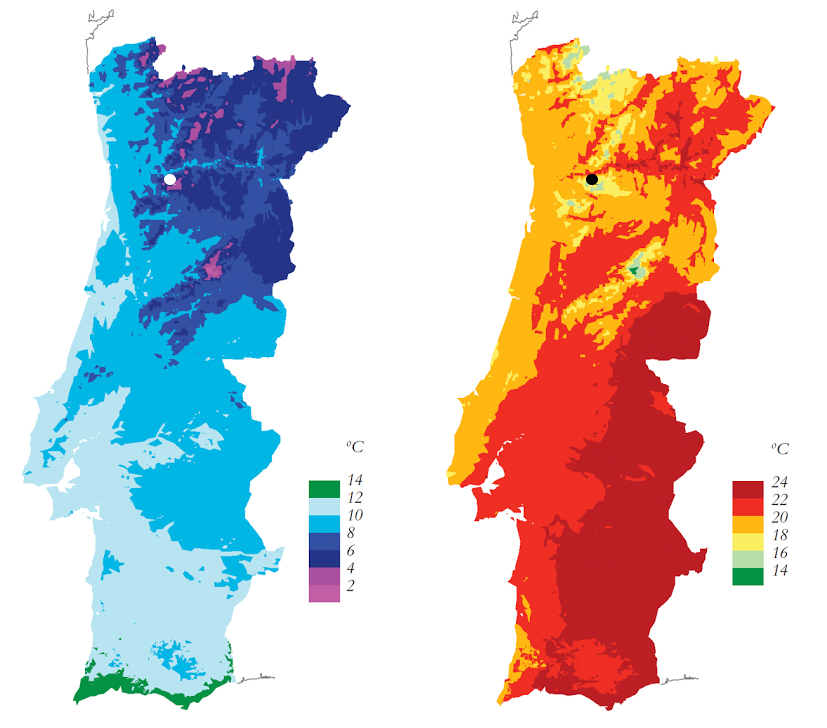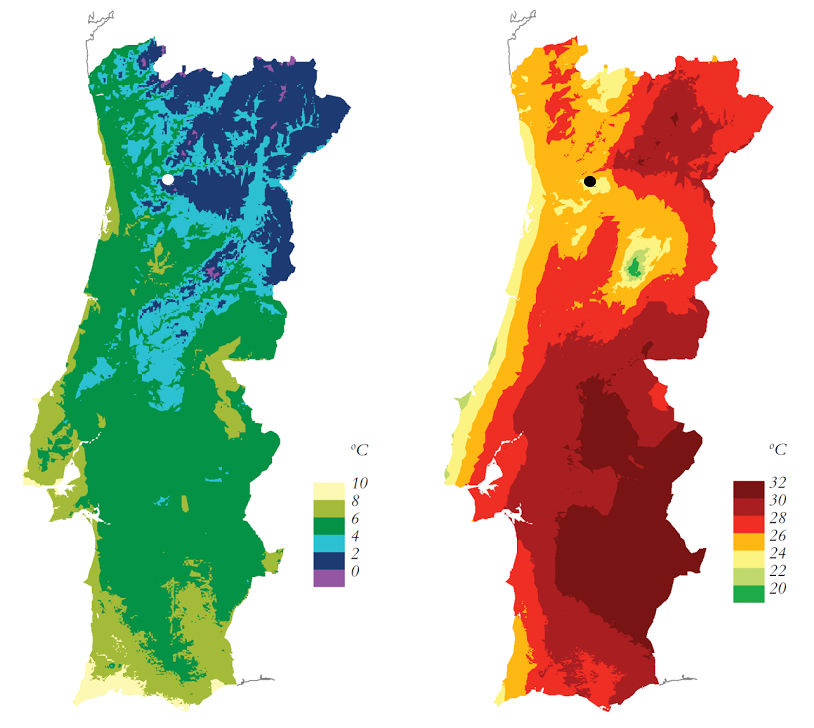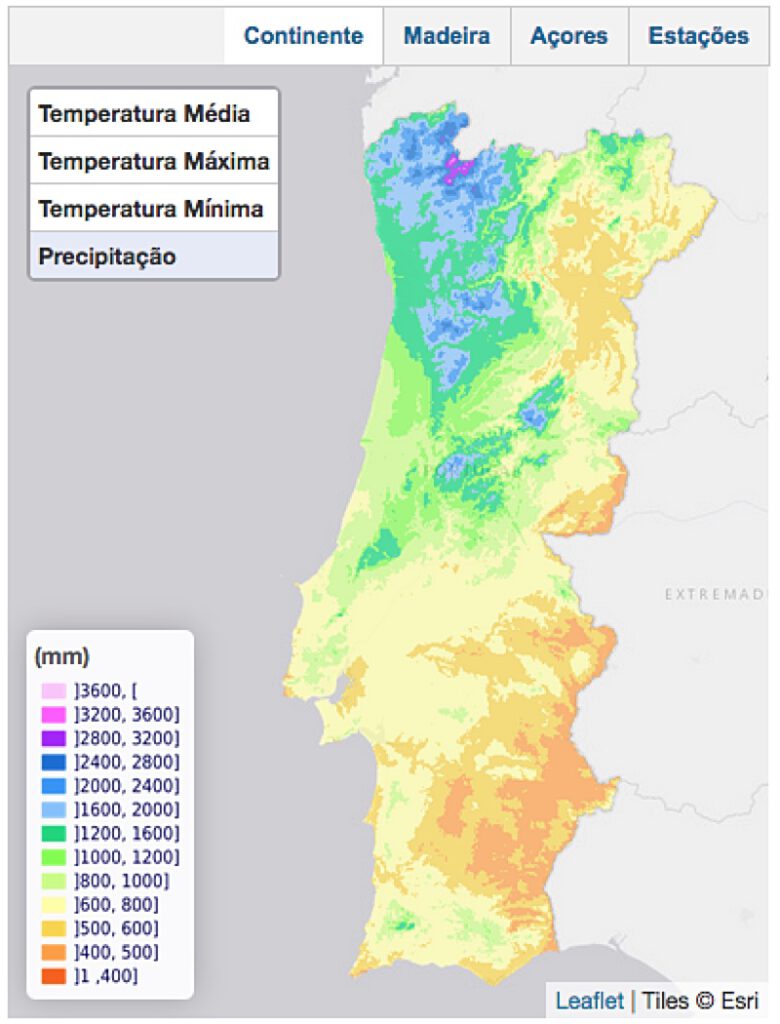Last week we received a kind email from a reader. She was thinking about emigrating from The Netherlands to (central) Portugal. But her worries about the heat in summer was holding her back. ‘What’s your experience with the Portuguese climate?’, she asked.
Well, I had to admit, that is really difficult to answer. Because it’s subjective; Nuno and I already have different opinions about it. But I will try to say something that makes sense.
Weather in Portugal, differences within the country
We live in the Douro Valley, ±75km land inwards from the coast.
People from Porto find our winters cold and our summers hot.
People from Viseu or Castelo de Branco, find our winters wet and mild and our summers pleasant.
In general, you can say that the coastal area of Portugal has mild winters and summers.
I found some images to illustrate this.
These are the average temperatures in winter (left) and summer (right), between 1971-2000:

Right: Average temperatures in summer, between 1971-2000. We are at the black dot.
source: www.geografia-ensino.com
Average temperatures include day and night temperatures, so if you want to avoid cold winter nights or hot summer days, you have to look at the minimum winter temperatures and maximum summer temperatures:

Right: Average maximum temperatures in summer, between 1971-2000.
source: www.geografia-ensino.com
The Portuguese climate: Sun and humidity
For us, there are two important things that characterize the Portuguese climate: the strength of the sun and the humidity.
From June to September, it is mostly dry, sunny weather here. Which is great, but the sun’s rays are really intense. It is not so much the heat (we have around 20 days annually, above 30˚C), but it is the harsh sun that I find hard to bear. The laundry, drying on a line, loses its color or its “stretch” because the nylons become softer. The plants and grass in the garden stop growing and sometimes the trees even lose their leaves.
If you have enough shady spots, the heat is actually quite bearable. Because it is dry heat. And you learn to adapt to it: You don’t go on a hike between 2-5 pm.
At night, the temperature drops to a comfortable 18˚C. That is why the mornings in summer are really pleasant.
From October to May the weather is changeable. Depending on the wind direction, it is dry and cold (easterly wind) or soft and wet (westerly wind). In the area where we live, the humidity during these months is around 85%. Portuguese tend to keep their coats on in poorly heated houses, restaurants, bars, offices, … Actually, in any poorly heated building, and you will see traces of black mold everywhere. The humidity makes the ‘feels like temperature’ much lower than it really is. Your laundry doesn’t dry, everything feels damp. This is a recurring topic in facebook groups of complaining immigrants from much colder countries, in every part of Portugal!
Wet or dry?
In a year we have approximately 100 days of rain. December, January, and April seem to be the wettest months. Taking climate change into account, Portugal will get drier in the next decades. For the already dry and hot areas, like the Alentejo, this is alarming. In recent years the droughts have been so extreme, that cattle were dying.
Our area maybe not score well on summer and winter temps and clear days, at least we don’t have to worry about drought, yet. I found that a great relief, especially in relation to the associated risk of wild fires.
Here is a little map with the annual rainfall in Portugal:

Source: IPMA
Honestly, answering this question surprised us! We didn’t realize that
1. we are living in one of the coldest and wettest places in Portugal (we thought that would be in Minho and Guarda)
2. the differences within the country are so large.
So, if you are thinking about emigrating to Portugal or planning a vacation, keep this all in mind.
Our favorite time of year, in terms of weather, is May and June.
A few Portuguese words about climate:
| temperature | a temperatura |
| climate | o clima |
| season | a estação |
| winter | o Inverno |
| drought | drought |
| spring | a Primavera |
| summer | o Verão |
| autumn | o Outono |
| a hot summer | um Verão quente |
| a wet autumn | um Outono húmido |
| a cold winter | o frio do Inverno |
| precipitation | precipitação |
| damp / humid | húmido |
| does it often rain here? | chove frequentemente aqui? |
| heat | calor |
| dry | seco |
| scorching heat | calor escaldante |
| is it always so windy here? | está sempre tão ventoso aqui? |
| the drought | a seca |
| mild | ameno |
| sun’s rays | raios de sol |

